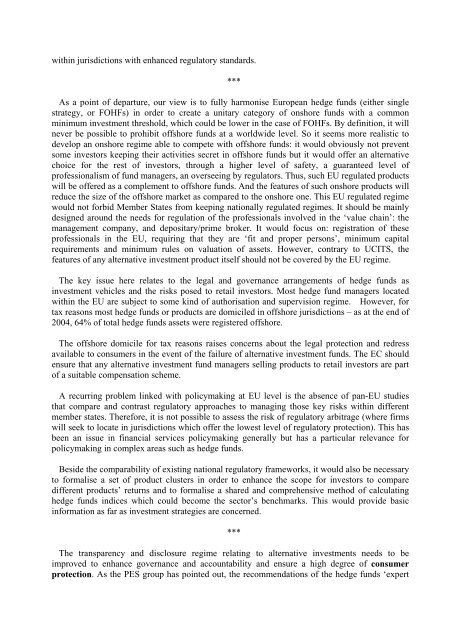Executive summary - Udo Bullmann
Executive summary - Udo Bullmann
Executive summary - Udo Bullmann
- No tags were found...
Create successful ePaper yourself
Turn your PDF publications into a flip-book with our unique Google optimized e-Paper software.
within jurisdictions with enhanced regulatory standards.***As a point of departure, our view is to fully harmonise European hedge funds (either singlestrategy, or FOHFs) in order to create a unitary category of onshore funds with a commonminimum investment threshold, which could be lower in the case of FOHFs. By definition, it willnever be possible to prohibit offshore funds at a worldwide level. So it seems more realistic todevelop an onshore regime able to compete with offshore funds: it would obviously not preventsome investors keeping their activities secret in offshore funds but it would offer an alternativechoice for the rest of investors, through a higher level of safety, a guaranteed level ofprofessionalism of fund managers, an overseeing by regulators. Thus, such EU regulated productswill be offered as a complement to offshore funds. And the features of such onshore products willreduce the size of the offshore market as compared to the onshore one. This EU regulated regimewould not forbid Member States from keeping nationally regulated regimes. It should be mainlydesigned around the needs for regulation of the professionals involved in the ‘value chain’: themanagement company, and depositary/prime broker. It would focus on: registration of theseprofessionals in the EU, requiring that they are ‘fit and proper persons’, minimum capitalrequirements and minimum rules on valuation of assets. However, contrary to UCITS, thefeatures of any alternative investment product itself should not be covered by the EU regime.The key issue here relates to the legal and governance arrangements of hedge funds asinvestment vehicles and the risks posed to retail investors. Most hedge fund managers locatedwithin the EU are subject to some kind of authorisation and supervision regime. However, fortax reasons most hedge funds or products are domiciled in offshore jurisdictions – as at the end of2004, 64% of total hedge funds assets were registered offshore.The offshore domicile for tax reasons raises concerns about the legal protection and redressavailable to consumers in the event of the failure of alternative investment funds. The EC shouldensure that any alternative investment fund managers selling products to retail investors are partof a suitable compensation scheme.A recurring problem linked with policymaking at EU level is the absence of pan-EU studiesthat compare and contrast regulatory approaches to managing those key risks within differentmember states. Therefore, it is not possible to assess the risk of regulatory arbitrage (where firmswill seek to locate in jurisdictions which offer the lowest level of regulatory protection). This hasbeen an issue in financial services policymaking generally but has a particular relevance forpolicymaking in complex areas such as hedge funds.Beside the comparability of existing national regulatory frameworks, it would also be necessaryto formalise a set of product clusters in order to enhance the scope for investors to comparedifferent products’ returns and to formalise a shared and comprehensive method of calculatinghedge funds indices which could become the sector’s benchmarks. This would provide basicinformation as far as investment strategies are concerned.***The transparency and disclosure regime relating to alternative investments needs to beimproved to enhance governance and accountability and ensure a high degree of consumerprotection. As the PES group has pointed out, the recommendations of the hedge funds ‘expert





